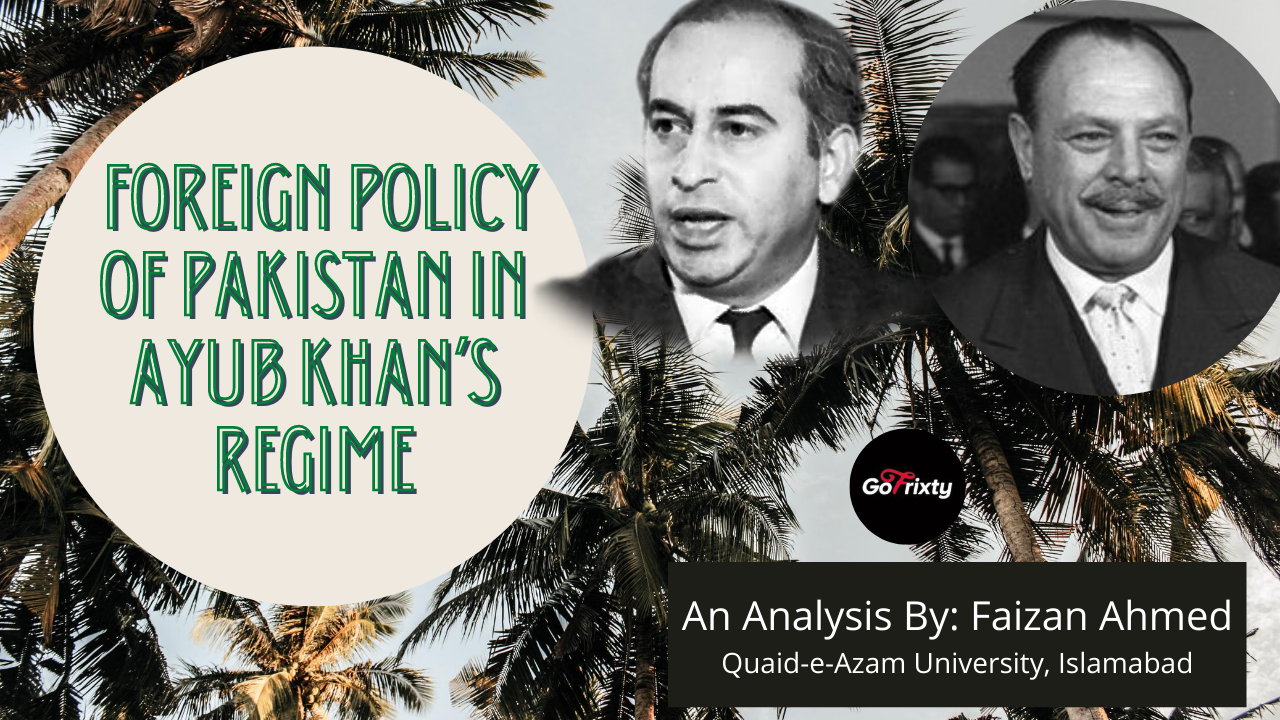Abstract
This research paper narrowly follows the foreign policy of Pakistan during the 1960s period which was fashioned by President Ayub Khan and foreign minister Zulfiqar Ali Bhutto. Retrospectively, Pakistan’s foreign policy inclined toward the United States of America. Pakistan had signed many alliances with US while in this phase of time Pakistan foreign policy thinkers started to transit the alignment policy from West to Eastern bloc of communist countries. Transition process had started with the development projects which Pakistan had initiated with communist and Afro-Asian countries i.e. Oil exploration, Karakoram Highway, Karachi Steel Mills. However, Pakistan had fought two wars with her de facto enemy India and in return US-imposed embargo on South Asia, eventually, South Asia had a short supply of military assistance but Pakistan which solely relied on US assistance had to accumulate military supply from other countries. At Last, Pakistan had to give up East Pakistan in 1971.
Introduction
A foreign policy constitutes relations with other countries vis a vis international and regional cooperation are also dealt with it. Peculiarly, for those countries which had emerged due to clash of the colonial system, it had become an important means of solving problems involved in strengthening their independence, breaking old and establishing new relations with other former parent states, developing many-sided relation with other countries of the world as well as being important in the sphere of internal reorganization. Therefore, foreign policy determines the strength of nation-building, geopolitical strategy, and external political dilemmas. As Geo-political and strategic position in South Asia, Pakistan became an inevitable component for the contemporary world of that time. Although limited resources and liabilities and the most security threat from her de-facto enemy India, she had to become an allay of the United States of America.
The foreign policy discourse remained complex in the first decade of her development. It had passed through many stages. In the early years, it adhered to a neutralist course then it departed from this to join a bloc of US for military and financial assistance, hence, Pakistan signed SEATO (South East Asia Treaty Organization was also known as Manila pact signed in 1954.) and CENTO Central Treaty Organization. pacts. Subsequently, at the turn of 1960s, Pakistan foreign policy thinkers started to review the policy toward US. Meanwhile, Pakistan drifted her policy inclination toward the search of other friends and extended her relationship with socialist and Afro-Asian countries.
This paper will proceed to understand the factors and causes which brought Pakistan into transition state. As being an allay of US, Pakistan had become part of the politics of bipolar world, eventually, Pakistan had faced antagonism and obsession from the remaining world. Furthermore, US did not support Pakistan in any territorial issue with India and when the war was breaking out between India and Pakistan, US imposed an embargo on South Asia. Even though, India had been supported by the US for her own regional interest against China.
The US was not happy with our relationship with China and Soviet Union and therefore when Sino-Pak treaty of friendship was signed in 1956 and border agreement signed in 1963 US not only condemned these; even declared it against India and international peace. In an account of Soviet Union, Pakistan had been invited to Moscow since 1950 but Pakistani premier had not visited Soviet until early 1960. However, during this time U-2 spy plane incident happened while Soviet remained interested in good relationship with Pakistan. 1960s transition policy was a breakthrough in Pakistan history. It brought improvement in relation the China and the Soviet Union. Multiple financial and technical assistance for oil exploration had been offered from the Soviet Union and China supported Pakistan in an account of Kashmir.
Rethinking About the Alignment policy
Particularly, two major events contributed to a rethinking of the policy toward the US. Firstly, Pakistan had been victimized by the Soviet Union on the incident of U-2 spy plane of US which surveyed the Soviet Union from Pakistani territory; however, Soviet shot it down but threatened Pakistan of retaliation. US was responsible for this incident while Pakistan’s position was perturbed in the International arena.
Secondly, US-developed Inter-continental Ballistic Missiles and high yield nuclear carrier, planted in 1960, weighted India to combat China’s role in Asia-Pacific. Pakistan observed this policy shift in the USA and when president Ayub Khan visited US in1961, he brought it into notice before the Kennedy administration that her policy toward Pakistan is not persuasive and suggested that Pakistan was the only country which always stood with the people of America and in future if any trouble comes to them Pakistan would not lean back from helping her.
Ayub khan was not comfortable with the US policy shift, therefore, he tried to bind the ties with US. India was the policy-centre of US. Despite Pakistan’s concerned, US was continuing supply of arms to India. When the war broke out between India and China, US and other western countries rushed weapon and heavy artillery to India, trained their soldiers by joint ventures. These developments were creating weaponry-disequilibrium in South Asia. Specifically, Pakistan which was solely depended on US military assistance got malign and as being US-allied, Pakistan diplomatic relation with the Muslim world as well as other Afro-Asian countries got discredit. The favour was on its peak that India did not need any security clearance for transferring her arm. Consequently, Pakistan had faced segregation in a diplomatic tunnel with other countries. Transition policy had initiated to prevent one-sided influence over the affair of the domestic and external affair of foreign policy.
Improving Relation with the Soviet Union
US policy inclination toward India brought a trickledown effect on Pakistan’s foreign policy. Henceforth, Pakistan policymakers were eager to search for friends rather than to be one Western-allied. Pakistan was reframing her foreign policy in which she would follow bilateral equation with the US and Soviet Union. Multiple steps were under observation to meet the required level of friendship with the Soviet Union. Consequently, Pakistan expanded cooperation with the Soviet Union and there were following agreements signed between Pakistan and Soviet with the passage of time.
- In 1961, a Pakistani delegation went to the Soviet Union to seek aid for oil exploration. It was successful in obtaining a $30million loan to be repaid in twelve-year at 2.5 per cent interest.
- in 1963 Pakistan signed a barter-agreement with Soviet of over one-million-dollar value to exchange jute for Soviet railway equipment. Cooperation in other fields was taking place. Thus, in 1963, Pakistan concluded an on-air agreement with the Soviet Union. The Pakistan international airlines began operating its services to London via Moscow and Frankfurt and the Aeroflot service of the Soviet Union was extended to Karachi via Kabul.
- The volume of the trade between the two countries was also on the increase for example during 1963-1964 Pakistan imported Rs. 40.5 million and exported Rs. 12.9 million. In 1965 trade turned into the favor of Pakistan when 80 million worth of goods exported and 9 million imported. According to political-economist S. Akbar Zaidi, Pakistan was in the phase of the golden period in the account of growth rate which was astonishing with 6.5 GDP. And Balance of payment (BOP) was also improving
- Pakistan started to seek cooperation in the scientific field with the Soviet Union. It concluded an agreement between them. According to this agreement, students, teachers, and scholars could go to the Soviet Union. And the Soviet Union would send their scholars to Pakistan for exchange of knowledge in the field of science. Furthermore, cooperation widened in art, culture, Radio, television, and Sports.
- After Post Ayub visit the Soviet Union reviewed her traditional policy of identifying with and supporting the Indian position on Kashmir underwent a change. This was not a sudden change on the part of the Soviet Union but calculated move in line with the changes in her perceptions of Pakistan and her leadership. The Soviet Union declared to establish a better relationship with Pakistan after perceiving an ascendancy of Pakistani leadership which was willing to normalize the leadership with the Soviet Union.
- During the 1965 war between India and Pakistan, the Soviet Union played a somewhat neutral role. She wished to settle a dispute between them, and China gave an ultimatum to India to stop further aggression. Although the ultimatum was probably nothing more than an attempt to win friends and influence people.
- The Soviet Union was playing a role to resolve a dispute between Indo-Pak. Soviet-made Pakistani and Indian politician meet in Tashkent and negotiated they’re concerned. At the conclusion of the Tashkent conference in January 1966, a declaration was signed by President Ayub Khan and Indian premier Shastri with the Soviet premier as a witness. It called upon India and Pakistan, among other things, to resolve their differences peacefully and through bilateral negotiations.
- It was the third visit of Ayub Khan in 1967 which considered 3rd step toward strategic partnership with the Soviet Union and in return Soviet premier Alexi visited Pakistan in 1968 and 1969, exempt of any point of dispute, came into a different agreement such as economic, cultural and other fields. Along with this way, different officials of one another had started to visit each other as one of the Soviet foreign minister Grechakov visited Pakistan in 1969 and gave his words to support technical and financial oil exploration to Pakistan as long as it completes.
Ties that Bind with China
Transition phase brought Pakistan into Bilateral equation with rising and developing economy of China. Pakistan signed many bilateral agreements with China including demarcation of border, trade, commerce, and air service agreement. The process of bilateral relations has strengthened with the passage of time and irrespective of ideological disposition both were involved in great length of agreements. As the International relation is concerned, all the states seek their interest, either they are tangible or non-tangible, short or long term. Critically, eco-political analysts have pointed out that China seeks her Supreme power doctrine in Asia-Pacific to fulfil via establishing her dominant role in South Asia, henceforth, she invested a large share of her GDP for developing underdeveloped states in Asia. In 1964 two parallel agreement i.e. Barter and the air was signed. According to Air agreement, Pakistan Airline started her flight operation to China.
Pakistan supported China in the UN General Assembly, although, the US had made an attempt to isolate her in International politics. Pakistan stood side by side with China during the 1960s and with the help of China, Karakorum highway has been completed.
Zhou Enlai, categorically, viewed that Kashmiris’ should have the right to self-determination and therefore, Chinese support them. He uttered such word during his visit to Pakistan in 1964. Moreover, Chinese delegates assured their support when Ayub Khan had visited China in 1965. Chinese proved her words in 1965 when Indo-Pak war was broke out and US-imposed an embargo on Pakistan so China was supplying tanks and heavy artillery to Pakistan. Even though the post-war crisis emerged, China and Pakistan remained side by side. This period had been explored as more cooperation and enhance their security approach toward each other. In an account of cooperation, a number of statesmen visited each other such as Chinese president Liu Chao Chi with his foreign minister visited Pakistan in 1966 and then Zhou Enlai visited Pakistan in June 1966. Pakistan president Yahya Khan visited China to ties that bind.
Diminishing Ties with the US
The Us was unhappy over Pakistan’s effort to improve its relationship with China. The US described the Sino-Pakistan air agreement as “an unfortunate breach of the free world solidarity”. She advised Pakistan not to invite Zhou Enlai for an official visit in 1964. Pakistan did not listen to US advice. In return US retaliated by withdrawing the offer of financial assistance for the construction of a new airport at Dhaka. Ayub Khan’s scheduled visit to the US in April 1965 was postponed.
The divergence between the two states widened as Pakistan was unable to invoke any security arrangement with the US during its war with India in September 1965. The US imposed an embargo on South Asia which mainly affected Pakistan because Pakistan was depended on US military assistant. One year later embargo partly eased in March 1966 on non-lethal military equipment supplied. Although no new military technology handed to Pakistan, but some arm and equipment were supplied to Pakistan during 1970-71.
Also Read ???? An analysis of Industrial Policies of Pakistan 1972-1977 | Bhutto Regime
A new embargo was imposed by the US when a new war broke out between India and Pakistan in November 1971. Pakistan had to face a serious shortage of weapons in war and it put the case of Pakistan alienation toward the US on hot bricks. M. Ayub Khan, for example, in his political autobiography, Friend not Masters, notes that by the time of its coming to power, the “political identification of the country [Pakistan] with the West was complete”. Pakistan had brought herself into the position of bilateral balance. Eventually, Pakistan had acquired military weapon from different sources such as Turkey and Iran, all the above, China remained dominant supplier of weapon to Pakistan from post-1965 war. Exceptionally, this was the time when Pakistan also started relay to their own military product.
Pluralistic Perspective
Pakistan drifted her foreign policy approach from Pro-West to an independent and pluralistic perspective on foreign relation. However, the Government of Pakistan maintained that they are not against the US policy to extend military aid but the huge quantity of military aid to India disturbed the balance of power in South Asia. It vowed to cultivate mutually advantageous bilateral relation with all states irrespective of their ideological disposition and argued that its interaction with one state would neither influence its relationship with any other state nor were these ties directed against any particular test.
Thus, proliferating relation with communist bloc i.e. people republic of China and Soviet. Pakistan did not apart from US-sponsored pact, despite their importance was declined. Pakistan followed a bilateral balance approach which was not determined as independent but bilateral and mutually assured in foreign relations. On this regard, Ayub Khan has taken pain to explain that Pakistani present policy is not an independent policy and that there is a fundamental difference between Pakistan policy of setting up “Bilateral equation“ with the three great powers and India’s policy of non-alignment. (Ayub khan chooses to call it neutralism). “practice during the early fifties he writes: “by independence” is meant freedom to criticize and curse everybody else.
Watch ???? Imran Khan and The Minus-1 | Will Imran Khan be replaced or survive?
Pakistan did not agree with the Soviet Union draft of Asian Collective Security System in 1969 while she remained in bilateral relation with the Soviet Union.
Relations With India in related to the foreign policy of Pakistan
Since the partition of British India, Pakistan and India had an innumerable bone of contentions, including water distribution, financial share, a quota of military weapon and foremost territorial issues. Hence two-nation theory played a biased role to bring them on point of dispute and as Hindutva ideology that Motherland of India (Dharti Maa) could not be divided. Furthermore, Congress leader threatened Pakistan that she would return to India as soon. Pakistan’s security dilemma shaped according to the threat of her de-facto enemy India. From that day Pakistan remained feeling insecure from India which was the main cause that Pak-India relation had not become normal.
Although the water distribution problem was sorted out with the agreement of Indus Water treaty in1960, Kashmir has remained unresolved agenda of partition. Kashmir became a point of dispute which was brocade to normalize their relation. US and UK came on the board to resolve Pakistan and India issues, which for, they asked their foreign minister to hold talks. Hence, six meetings were held between them from 1962 to 1963 but the conclusion was inconclusive. Both sides were following hard and tough policy over Kashmir, therefore, no settlement could be done.
Pakistan’s all ethnopolitical group can come on one page to combat India from any insurgency. Hence Keith Collard also maintains that India “provides a powerful stimulus to Pakistan’s national unity”
Watch Video of Top 10 places to visit in Islamabad that we have designed for you | Click here to watch the video |
The transition phase of Pakistan foreign policy became hard in the account of India because in this period Pakistan had three one-on-one geographical clashes with India. Firstly, Rann of Kutch became a point of conflict that led to limited war between them but when the Rann of Kutch crises did not get settle, the full-fledged war broke out between them in 1965. Again in 1970, India had a chance to disintegrate Pakistan because Pakistan was facing political instability due to disparity between East and West Pakistan and India used it. Pakistan dismembered and East Pakistan emerged as a new state like Bangladesh. In 1971 war India imprisoned 93000 Pakistani people including army personnel. It was hard to accept that Pakistani troops surrendered to the Indian army and Pakistan lost that war which disposed of Pakistan as a loser.
Crisis In East Pakistan and international responses
The Soviet Union was disappointed on the Pakistani instance over Asian Collective security plan. She warned Pakistan for attempting military action in East Pakistan and Soviet did not stand with Pakistan on the stance of military action in East Pakistan. Therefore, she did every possible effort to prevent Pakistan from military operation in her own integral part. Soviet also held grievances over the reconciliation process of Sino-US in which Pakistan played a vital role in July 1971.
Pakistan stood on the instrumental approach for these ties. Soviet decided to pressurize Pakistan from India. Hence, foreign minister of Soviet brought with a proposal of friendship and cooperation to India that was the sole purpose to undermine Pakistan International position and empower India to adopt a harsh policy on the East Pakistan crisis. Even though Soviet put the diplomatic relation with Pakistan on the hot bricks, she supplied great heavy weaponry to India for supporting the civil war in East Pakistan and MOKTI BAHENI revolutionary movement had been supported by India. Last but not least, she was lobbying against Pakistan that Pakistan is doing aggression on Line Of Control. She used her veto right three times in United Nation Security Council against Pakistan on December 5,6 and 13 in 1971.
Also Read ???? Temple dilemma and Imran Khan government
The US and China did not endorse Pakistan military action in East Pakistan, but they avoided any public criticism on Pakistan policies. Expressing support for the territorial integrity of Pakistan as well as China expressed such advised to settle this problem with political consensus.
Conclusion
Pakistan foreign policy had been determined by the acceptance of US aid and the course had already been set. Pakistan’s ultimate problems were Security, Kashmir, and canal water, therefore, Pakistan had to determine how far her policy helped her to resolve these issues. Perhaps in such situation, Pakistan decision-maker found an easy and earliest way to overcome the crisis via a joining US bloc. However, Pakistan had been victimized during the West allied. She became a proxy state for the US. In the time of the Cold War, Pakistan was used to survey the Soviet Union i.e. U-2 spy plane incident occurred which categorically, wrath Pakistan’s position in the international world.
Also read ???? Dates of Khairpur, Sindh – A Concise Report
As policy shift was necessary for rebuilding the structure of foreign relation with the world Ayub Khan regime used a bilateral equation to transit the policy. while in that contemporary international world, Pakistan was not interested in other options. Pakistan did not struggle to improve her relationship with gulf states as well as regional cooperation was also lacked in Pakistan policy. Even though the late 1970s Soviet was also disappointed by Pakistan’s policy when she denied entering in Asian Collective Security plan and their gesture to hold the friend right was not appealing. More of the above as Yahya Khan came in power Soviet Union priorities with Pakistan underwent a change.





I think this is among the most important information for me. And i am glad reading your article. But should remark on few general things, The website style is wonderful, the articles is really nice : D. Good job, cheers
[…] An Analysis of Pakistan Foreign policy in Ayub Khan’s Regime […]
[…] An Analysis of Pakistan Foreign policy in Ayub Khan’s Regime […]